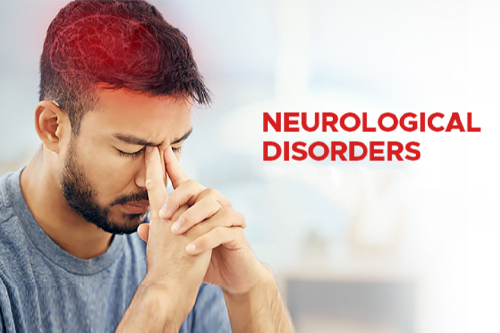
Neurological Disorders
Neurological disorders can affect millions of people worldwide, impacting brain, spinal cord, and nerves. Such conditions can greatly alter a person’s quality of life, with physical, cognitive, and emotional challenges. Early diagnosis , treatment are essential in managing symptoms and improving outcomes.
In Nagpur, renowned neurologist Dr. Ritesh Nawkhare has been at the forefront of diagnosing and treating a wide range of neurological disorders. With his expertise and advanced treatment methods, patients receive world-class care right in the heart of Maharashtra.
Common Neurological Disorders Treated by Dr. Ritesh Nawkhare
Dr. Ritesh Nawkhare specializes in treating a variety of neurological conditions, including:
1. Stroke
- Weakness or numbness in face, arm, or leg on one side of body
- Confusion and difficulty in speaking or writing
- Dizziness and inability to walk
2. Epilepsy
- Repeated seizures or convulsions
- Temporary confusion
- Uncontrollable movements of arms and legs
- Treatment: Medication, dietary therapy, and in some cases, surgical intervention.
3. Parkinson's Disease
- Tremors and shaking
- Slowed movement (bradykinesia)
- Muscle stiffness
- Impaired posture and balance
4. Multiple Sclerosis (MS)
- Numbness or weakness in limbs
- Blurred or double vision
- Fatigue and dizziness
- Treatment: Immune-modulating therapies, physical therapy, and lifestyle modifications help control the disease progression.
5. Alzheimer's Disease and Dementia
- Memory loss affecting daily activities
- Difficulty solving problems
- Confusion with time and place
- Treatment: Though there is no cure, medications and cognitive therapies can slow progression and improve quality of life.
6. Migraine and Chronic Headaches
- Throbbing pain, usually one side of head
- Nausea and vomiting
- Sensitivity to light and sound
- Treatment: Dr. Nawkhare provides medication, lifestyle counseling, and stress management techniques to reduce headache frequency.
7. Neuropathy
- Numbness or tingling in extremities
- Sharp or burning pain
- Muscle weakness
- Treatment: Lifestyle modifications, medication, and physical therapy help manage symptoms.
8. Brain Tumors
- Persistent headaches
- Vision changes
- Seizures
- Treatment: Surgery, radiation therapy, and chemotherapy are used depending on the tumor type.
9. Spinal Cord Disorders
- Back pain and stiffness
- Loss of sensation or paralysis
- Treatment: Dr. Nawkhare specializes in both surgical and non-surgical treatments for spinal cord disorders.
Why Choose Dr. Ritesh Nawkhare for Neurological Disorders in Nagpur?
- Expertise in Advanced Neurology: With years of experience, Dr. Nawkhare is a leading neurologist in Nagpur.
- State-of-the-Art Technology: His clinic is equipped with the latest diagnostic tools and treatment modalities.
- Personalized Treatment Plans: Every patient receives a customized care plan tailored to their condition.
- Comprehensive Care: From diagnosis to rehabilitation, all aspects of neurological care are covered.
- Patient-Centric Approach: Compassionate and dedicated care ensures the best possible outcomes.
Advanced Diagnostic and Treatment Facilities
- MRI and CT scans for accurate diagnosis
- EEG and EMG for neurological assessments
- Physiotherapy and rehabilitation support
- Minimally invasive surgical options
Lifestyle Tips to Prevent Neurological Disorders
- Regular Exercise: Helps maintain brain and nerve health.
- Healthy Diet: A balanced diet rich in antioxidants supports neurological function.
- Adequate Sleep: Essential for brain repair and cognitive function.
- Stress Management: Reduces the risk of neurological conditions.
- Regular Health Checkups: Early detection improves treatment outcomes.
Diagnosis of Neurological Disorders
- Neurological Examination – Evaluating motor skills, reflexes, coordination, and cognitive function.
- Imaging Tests – MRI, CT scans, and PET scans help visualize abnormalities in the brain and spinal cord.
- Electroencephalogram (EEG) – Records electrical activity in the brain to diagnose epilepsy and other conditions.
- Lumbar Puncture (Spinal Tap) – Analyzes cerebrospinal fluid for infections or other abnormalities.
- Genetic Testing – Identifies inherited neurological disorders.
Treatment Options for Neurological Disorders
- Medications – Used to manage symptoms, slow disease progression, or prevent seizures.
- Physical Therapy – Helps improve movement, coordination, and muscle strength.
- Surgery – Necessary for conditions like brain tumors, epilepsy, or hydrocephalus.
- Lifestyle Changes – A balanced diet, regular exercise, and stress management can support brain health.
- Psychological Support – Counseling and support groups help patients cope with emotional and cognitive challenges.Contact Us
Conclusion
Neurological disorders affect millions of people worldwide and can have significant impacts on daily life. Early detection, proper diagnosis, and appropriate treatment play a crucial role in managing these conditions. If you or a loved one experiences symptoms of a neurological disorder, consult a neurologist for expert guidance and care.Schedule your Consultation with Dr. Ritesh Nawkhare
